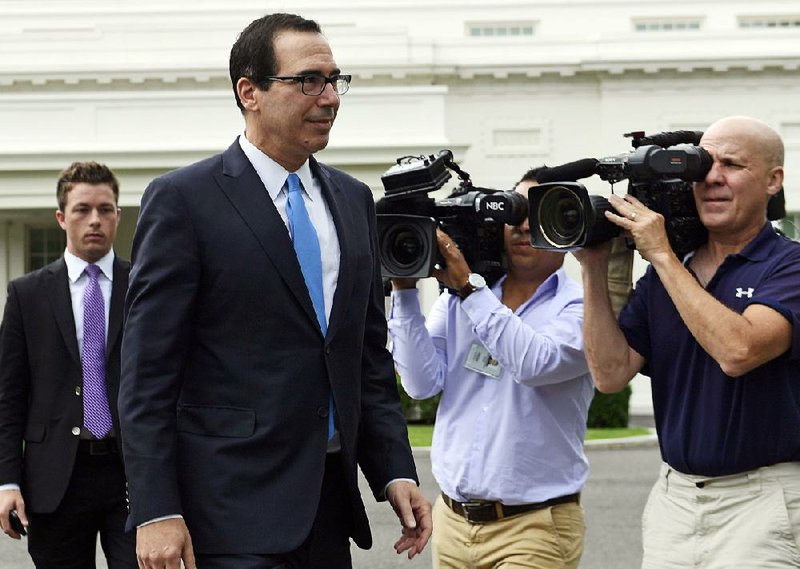WASHINGTON -- President Donald Trump said his administration will take a more moderate approach to limit Chinese investment in the United States, rejecting more aggressive restrictions that would have imposed new curbs on Beijing and further inflamed a trade dispute between the two countries.
The administration's more conciliatory stance raised at least the possibility that the two sides could work toward a negotiated end to the punishing tariffs they're set to impose on each other's goods beginning July 6.
Trump said Wednesday that he supports a bipartisan push in Congress to expand the authority of the Committee on Foreign Investment in the United States, which reviews foreign investments for security threats. Trump said he will back an expansion of the committee's powers to address concerns about China buying stakes in U.S. companies in order to acquire valuable technology and trade secrets.
"I have concluded that such legislation will provide additional tools to combat the predatory investment practices that threaten our critical technology leadership, national security and future economic prosperity," Trump said in a statement Wednesday morning.
It was unclear whether the Trump team's policy shift would lead to a truce between the world's two biggest economies, or whether any formal negotiations might soon begin. But the top White House economic adviser said the two sides are "in communication." And analysts said they took heart that the administration had offered some semblance of an olive branch to Beijing.
"It seems like this move is being undertaken with the goal of coming to a resolution ultimately on the trade policy issues the U.S. has with China," said Stephen Ezell, who manages global innovation policy at the Information Technology and Innovation Foundation think tank.
Last month, the White House said that by the end of this week, it would announce tight new curbs on Chinese investment. The idea was to prevent state-owned or politically connected Chinese companies from buying advanced U.S. technology. Beijing is seeking such technology as part of its "Made in China 2015" initiative, a road map to its goal of becoming a global tech leader.
But on Wednesday, the Trump administration announced a less-draconian approach: It would work with Congress to strengthen reviews of foreign investment under the existing Committee on Foreign Investment, led by Treasury Secretary Steve Mnuchin. The committee process applies to all countries -- not just China -- and its reviews are conducted on a case-by-case basis.
"It makes eminent good sense," said Christopher Brewster, a senior member of the Committee on Foreign Investment practice at the law firm Stroock & Stroock & Lavan.
"Defining technology that is 'off limits' is an exceedingly difficult task," Brewster said. "For this reason, broad-scale investment restrictions are a clumsy tool that inherently run the risk of being over-inclusive or under-inclusive. Using the [Committee on Foreign Investment] process is a more nuanced approach."
The House has approved a bill to strengthen the committee-authorization law, and the bill will likely be considered by a House-Senate conference committee for a Senate-approved defense measure.
Asked about the administration's shift, Mnuchin told reporters, "It is not a question of whether we are focusing on China or we are not focusing on China" but an issue of using all means to address trade disputes with Beijing.
"For those who want to say this is being weak on China, the answer is no," Mnuchin said. "The question was, "What were the appropriate tools?'"
Trump campaigned for the White House on a pledge to take a much more aggressive stance with China and other trading partners. He has long accused other nations of exploiting poorly negotiated trade deals and of using unfair practices to sell America far more than they buy from it. The United States last year posted a $552 billion trade deficit with the rest of the world -- $336 billion with China alone.
Washington and Beijing are sparring over China's attempts to supplant U.S. technological dominance, through cyber theft and policies that force American companies to hand over technology in exchange for access to the Chinese market.
On July 6, the United States is set to impose tariffs on $34 billion in Chinese imports -- a sum that could reach $450 billion if Beijing refused to yield and retaliated with its own sanctions. In response, China says it is prepared the same day to impose tariffs on billions in U.S. exports, including soybeans -- a direct threat to Trump supporters in America's heartland. Many members of Congress have warned the administration to avoid a trade war with China.
Trump's top economic adviser, Larry Kudlow, told reporters that the administration remains in communication with its Chinese counterparts.
"The president is unsatisfied with their response on the trade talks, and so he put out there the possibility of an additional tariff measure," Kudlow said. "The ball's in their court. I'm always the optimist, but I have to be realistic."
Information for this article was contributed by Paul Wiseman, Ken Thomas, Martin Crutsinger and Catherine Lucey of The Associated Press and by Jim Tankersley, Alan Rappeport and Ana Swanson of The New York Times.
Business on 06/28/2018
